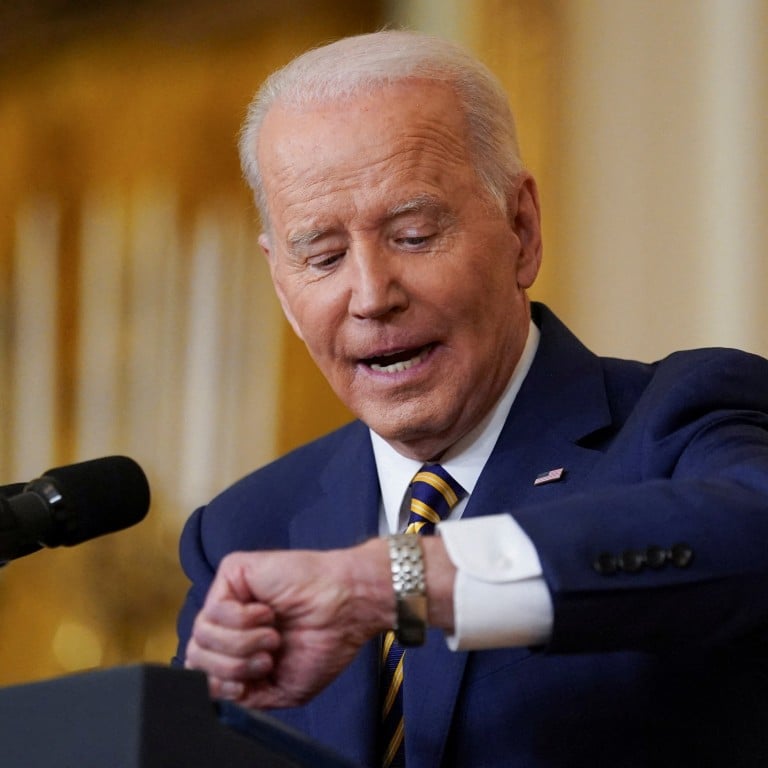
China balks at Biden’s insistence on maintaining Trump-era tariffs, while think tank urges ‘recoupling’
- Removing tariffs is ‘conducive to the recovery of the global economy’, commerce ministry says
- But President Joe Biden, while acknowledging pressure from the business community, says ‘we’re not there yet’
“The Chinese side has always believed that cancelling the additional tariffs is good for China, the United States and the world,” ministry spokeswoman Shu Jueting said when asked to comment on Biden’s statement. “Especially under the current inflationary situation, lifting additional tariffs is in the fundamental interests of consumers and producers in both China and the US, and it is conducive to the recovery of the global economy.”
China has insisted that all tariffs on Chinese imports added by the United States during the trade war must be scrapped immediately as part of any deal to end the protracted conflict, although it has fallen short of meeting of the targets set in the phase-one trade deal signed with the Trump administration.
‘Stalemate’ in US-China reach trade talk despite expiry of phase-one deal
Lu Xiang, a research fellow with the Institute of American Studies at the Chinese Academy of Social Sciences, expects China to keep pressing the US to remove the tariffs, by leveraging its strong position in the global supply chain.
“I believe that China will still maintain contact and pressure at the working level. After all, the cancellation of tariffs is in the interests of both parties, especially when US inflation is at a historically high level, but the US still believes that tariffs give it leverage,” Lu said.
Lu also suspects that Washington is unlikely to abandon the tariffs because the Biden administration wants to maintain a hard line on China, from trade to human rights issues.
“Right now, China is the only country with the most stable global industrial chain, which is the greatest asset and advantage,” Lu added.
Biden acknowledged that there has been pressure from the business community to drop the tariffs, but he said it was not enough to persuade him to change course – especially without any major concessions from China.
“I’d like to be able to be in a position where I can say they’re meeting the commitments, more of the commitments, and be able to lift some of it, but we’re not there yet,” Biden said at the White House press conference.
China’s commerce ministry said in late December that Beijing had “worked hard” to overcome “multiple adverse impacts” of the coronavirus pandemic, the global economic slowdown and supply-chain issues since the trade deal was signed in January 2020.
It also called on the US to “create a good atmosphere and conditions for the two sides to expand trade cooperation”.
According to calculations by the Peterson Institute for International Economics, from January 2020 through November 2021, China’s imports of covered goods reached 62 per cent of phase-one target, while US export figures put the figure at 60 per cent.
Meanwhile, China attracted US$173.48 billion worth of foreign direct investment in 2021, up 20.2 per cent from the previous year.
A report released by the Chongyang Institute for Financial Studies at Renmin University on Monday urged the US to turn its China economic policy from decoupling to cooperative “recoupling”, while keeping its policymaking separate from politics, which would open the door for a wide range of cooperation between the countries – from pandemic control measures to infrastructure construction.
What is urgently needed between China and the United States is a substantive, working-level dialogue to resolve existing practical issues
The report also said Beijing and Washington should consider restarting negotiations over a bilateral investment treaty, while also exploring new investment areas in emerging and financial industries.
Wang Jisi, a professor with the School of International Studies at Peking University, said that, despite attempts from Washington to rally support to oppose China, Chinese and US businesses remain deeply integrated.
“For the next step, what is urgently needed between China and the United States is a substantive, working-level dialogue to resolve existing practical issues,” Wang said in a blog post on January 11.


